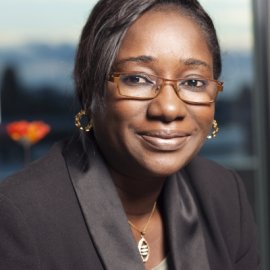Sociology, Fundamental Institute of Black Africa, Dakar, Senegal

Octobre 2013 à Juin 2014
Fatou Binetou Dial is a Senegalese sociologist, researcher at the Fundamental Institute of Black Africa (IFAN, Dakar, Senegal). Her work has focused on the marital journey of women in Dakar: Suffer marriage, take ownership of divorce?
After completing her PhD, she was a research assistant at the Research Institute for Development (IRD), while a lecturer at the University Gaston Berger of Saint-Louis (Senegal), at the Thiès University Centre and at the Institute “Population, Development and Reproductive Health” (IPDSR, Dakar).
She has worked on the sociology of family, marriage, divorce, polygamy, relations man/woman, reproductive health, female genital mutilation, migration, household and family, climate change, mobility of children and vulnerability in rural areas.
Aging in the South: social and economic condition for the elderly in Senegal
During her fellowship at IAS-Nantes, Fatou Binetou Dial will examine the dimensions of the actual or perceived solidarity in the household (Bengston & Roberts 1991) through intergenerational relationships. It is quite possible that the household, given in terms of various exchanges and responsibilities between individuals united by emotional and affective ties differs from the ‘household statistics’. Studies that examine the content and nature of such exchanges between générations are means of assessing the validity of the ‘'statistical household', and the ability for the concept to account for social solidarity and support functional. In a context of population aging in Europe as well as in Africa, it is essential to understand the complex patterns governing intergenerational relationships and their impact on the well-being. The data analysis of household surveys existing in Africa (Antoine, 2007) suggests that various forms of exchanges and intergenerational obligations are overseen by the traditional household surveys. This project will examine the use made of the household in different contexts and will more specifically analyze the influence that the definitions of household may have on the understanding of intergenerational relations. Finally, the focus will be set on the socio-economic situation of the elderly in both rural and urban areas.
DIAL, Fatou Binetou. Mariage et divorce à Dakar, itinéraires féminins. Paris : Karthala, 2008, 197 p.
DIAL, Fatou Binetou. Le divorce dans les différentes catégories sociales à Dakar. In Tahon, M.B. Famille et rapports de sexe : 4e congrès international des recherches féministes dans la francophonie plurielle. 5-10 juillet 2005, Ottawa. Montréal : éditions du Remue-Ménage, 2007, p. 85-101.
DIAL, Fatou Binetou. Le divorce, une source de promotion pour la femme ? Une enquête à Dakar et Saint-Louis (Sénégal). In Locoh, T. Genre et sociétés en Afrique : implications pour le développement. Paris : INED, 2007, p. 357-371.
Adjamagbo A., F. Ametepe, Antoine Ph., D. Beguy, DIAL, Fatou Binetou, et al. Unions-désunions : Les histoires d’amour ne sont jamais simples. In Antoine Ph. et Lelièvre E. États flous et trajectoires complexes : Observation, modélisation, interprétation. Paris : INED, p. 61-86. (coll. Méthodes et savoirs, n 5). English version: Union and separation: love stories are never simple. In Antoine Ph. and Lelièvre E. Fuzzy States and Complex trajectories. Observation, modelization and interpretation of life histories. Paris : INED, p. 55-76. (coll. Méthodes et savoirs, n 6).
Antoine Ph. and DIAL, Fatou Binetou. Mariage, divorce et remariage à Dakar et Lomé. In Vignikin K. et Vimard P. Familles au Nord, Familles au Sud. Louvain-la-Neuve : Academia Bruylant, 2005, p. 205-232.
Adjamagbo A., Antoine Ph. and DIAL, Fatou Binetou. Le dilemme des Dakaroises : entre travailler et « bien travailler ». In Diop, M.C. Gouverner le Sénégal : entre ajustement structurel et développement durable. Paris : Karthala, 2003, p.247-272.